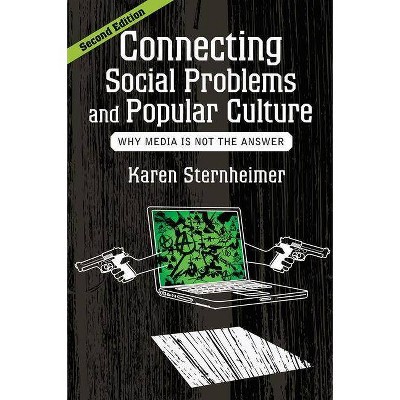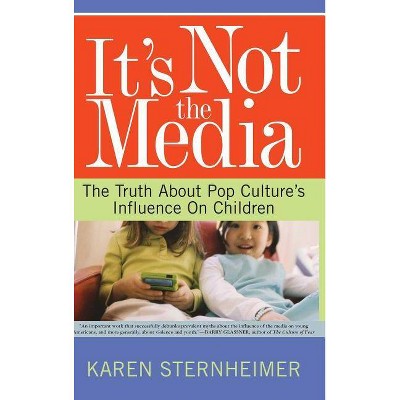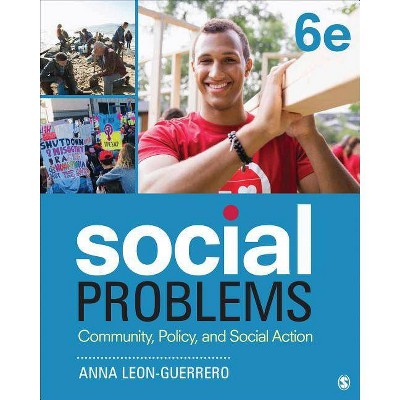Connecting Social Problems and Popular Culture - 2nd Edition by Karen Sternheimer (Paperback)

Similar Products
Products of same category from the store
AllProduct info
<p/><br></br><p><b> About the Book </b></p></br></br><p>Now in its second edition, <em>Connecting Social Problems and Popular Culture</em> goes beyond the news-grabbing headlines claiming that popular culture is public enemy number one to consider what really causes the social problems we are most concerned about. </p><p/><br></br><p><b> Book Synopsis </b></p></br></br><p>Is violence on the streets caused by violence in video games? Does cyber-bullying lead to an increase in suicide rates? Are teens promiscuous because of Teen Mom? As Karen Sternheimer clearly demonstrates, popular culture is an easy scapegoat for many of society's problems, but it is almost always the wrong answer.</p><p>Now in its second edition, <em>Connecting Social Problems and Popular Culture</em> goes beyond the news-grabbing headlines claiming that popular culture is public enemy number one to consider what really causes the social problems we are most concerned about. The sobering fact is that a media made them do it explanation fails to illuminate the roots of social problems like poverty, violence, and environmental degradation. Sternheimer's analysis deftly illustrates how welfare reform, a two-tiered health care system, and other difficult systemic issues have far more to do with our contemporary social problems than Grand Theft Auto or Facebook. The fully-revised new edition features recent moral panics (think sexting and cyberbullying) and an entirely new chapter exploring social media. Expanded discussion of how we understand society's problems as social constructions without disregarding empirical evidence, as well as the cultural and structural issues underlying those ills, allows students to stretch their sociological imaginations.</p><p/><br></br><p><b> Review Quotes </b></p></br></br><br>"This book encourages students to question the way that social scientific data is reported in mainstream media and to see the limitations of this type of research."<br>--<b><i>Communication Research Trends</i></b> <p/><b>Praise from the First Edition: </b><br>"The author cautions against focusing on the media as predator and turns readers' attention to themselves and the society they create around and conceivably 'for' their children and families to better grasp how people create and perpetuate social problems. Well researched, with an attention to policy details, this book helps debunk the notion that media is the cause of society's ills. Highly recommended."<br>--<b><i>Choice</i></b> <p/>"Focusing on ... children and young adults, [Sternheimer's] main argument is that the intersection of race, gender, and poverty makes social problems significantly complex, and as a result, we blame popular culture for societal quandaries because it is easier to convince ourselves that television and video games are the cause of social disparities... Sternheimer asks us to take another look. Her book is a well written rationale as to why we should."<br>--<b><i>American Sociological Association</i></b><br><br>"Karen Sternheimer s new book is a treasure and should be compulsory reading for anyoneinterested in media research, sociology, social policy, and free expression. Her elegant, concise review of key scholarship proves beyond a doubt that popular culture does not cause destructive behavior and makes a passionate call for the need to address the real roots of social ills in our troubled times: poverty, inequality, and an ailing educational system. More than just an excellent read, Connecting Social Problems and "Popular Culture" is an important book."<BR>Barna Donovan, Saint Peter s University <BR>"Dr. Sternheimer s book is a fascinating and important work regarding the way in which society constructs panics about media and the collusion of the scientific community in these fears. This work presents up-to-date scholarship and thought in this area and should be considered required reading for those involved in media effects research."<BR>Christopher J. Ferguson, Texas A&M International University <BR>"With this second edition, Karen Sternheimer provides a set of thoughtful responses to the often thoughtless reflex of many who blame the media for all social ills. Presented in concise and compact arguments, the book promotes critical reflection on and discussion about social problems suitable for use within the classroom and beyond."<BR>Daniel Thomas Cook, Rutgers University <BR>"This book encourages students to question the way that social scientific data is reported in mainstream media and to see the limitations of this type of research."<BR>"Communication Research Trends" <BR>Praise from the First Edition: <BR>"The author cautions against focusing on the media as predator and turns readers attention to themselves and the society they create around and conceivably for their children and families to better grasp how people create and perpetuate social problems. Well researched, with an attention to policy details, this book helps debunk the notion that media is the cause of society s ills. Highly recommended."<BR>"Choice" <BR>"Focusing on children and young adults, [Sternheimer s] main argument is that the intersection of race, gender, and poverty makes social problems significantly complex, and as a result, we blame popular culture for societal quandaries because it is easier to convince ourselves that television and video games are the cause of social disparities Sternheimer asks us to take another look. Her book is a well written rationale as to why we should."<BR>"American Sociological Association" <BR>"In "Connecting Social Problems and Popular Culture," Karen Sternheimer delivers a necessary synthesis, with a devastating media analysis, in response to the prevalent cottage industry of exaggeration, myth, and invention about popular culture s impacts on youth behavior. And in layering a critique of society, class, and race over actual evidence she produces a work of great value to those working with or teaching about youth."<BR>Anthony Bernier, San Jose State University <BR>"In this well researched book, Karen Sternheimer gives lie to a full spectrum of false fears about the effects of popular culture on young people. She provides valuable correctives to innumerable myths promulgated by opportunistic politicians, advocacy groups, and journalists."<BR>Barry Glassner, University of Southern California; author of "The Gospel of Food" and "The Culture of Fear"<BR>"<br><br>"Karen Sternheimer's new book is a treasure and should be compulsory reading for anyoneinterested in media research, sociology, social policy, and free expression. Her elegant, concise review of key scholarship proves beyond a doubt that popular culture does not cause destructive behavior and makes a passionate call for the need to address the real roots of social ills in our troubled times: poverty, inequality, and an ailing educational system. More than just an excellent read, Connecting Social Problems and "Popular Culture" is an important book."<BR>--Barna Donovan, Saint Peter's University <BR>"Dr. Sternheimer's book is a fascinating and important work regarding the way in which society constructs panics about media and the collusion of the scientific community in these fears. This work presents up-to-date scholarship and thought in this area and should be considered required reading for those involved in media effects research."<BR>--Christopher J. Ferguson, Texas A&M International University <BR>"With this second edition, Karen Sternheimer provides a set of thoughtful responses to the often thoughtless reflex of many who blame 'the media' for all social ills. Presented in concise and compact arguments, the book promotes critical reflection on and discussion about social problems suitable for use within the classroom and beyond."<BR>--Daniel Thomas Cook, Rutgers University <BR>"This book encourages students to question the way that social scientific data is reported in mainstream media and to see the limitations of this type of research."<BR>--"Communication Research Trends" <BR>Praise from the First Edition: <BR>"The author cautions against focusing on the media as predator and turns readers' attention to themselves and the society they create around and conceivably 'for' their children and families to better grasp how people create and perpetuate social problems. Well researched, with an attention to policy details, this book helps debunk the notion that media is the cause of society's ills. Highly recommended."<BR>--"Choice" <BR>"Focusing on ... children and young adults, [Sternheimer's] main argument is that the intersection of race, gender, and poverty makes social problems significantly complex, and as a result, we blame popular culture for societal quandaries because it is easier to convince ourselves that television and video games are the cause of social disparities... Sternheimer asks us to take another look. Her book is a well written rationale as to why we should."<BR>--"American Sociological Association" <BR>"In "Connecting Social Problems and Popular Culture," Karen Sternheimer delivers a necessary synthesis, with a devastating media analysis, in response to the prevalent cottage industry of exaggeration, myth, and invention about popular culture's impacts on youth behavior. And in layering a critique of society, class, and race over actual evidence she produces a work of great value to those working with or teaching about youth."<BR>--Anthony Bernier, San Jose State University <BR>"In this well researched book, Karen Sternheimer gives lie to a full spectrum of false fears about the effects of popular culture on young people. She provides valuable correctives to innumerable myths promulgated by opportunistic politicians, advocacy groups, and journalists."<BR>--Barry Glassner, University of Southern California; author of "The Gospel of Food" and "The Culture of Fear"<BR><br><br>"Dr. Sternheimer's book is a fascinating and important work regarding the way in which society constructs panics about media and the collusion of the scientific community in these fears. This work presents up-to-date scholarship and thought in this area and should be considered required reading for those involved in media effects research." --Christopher J. Ferguson, Texas A&M International University "With this second edition, Karen Sternheimer provides a set of thoughtful responses to the often thoughtless reflex of many who blame 'the media' for all social ills. Presented in concise and compact arguments, the book promotes critical reflection on and discussion about social problems suitable for use within the classroom and beyond." --Daniel Thomas Cook, Rutgers University<BR><BR> "This book encourages students to question the way that social scientific data is reported in mainstream media and to see the limitations of this type of research." --"Communication Research Trends"<BR><br><br><P>Praise from the First Edition: <P> "The author cautions against focusing on the media as predator and turns readers' attention to themselves and the society they create around and conceivably 'for' their children and families to better grasp how people create and perpetuate social problems. Well researched, with an attention to policy details, this book helps debunk the notion that media is the cause of society's ills. Highly recommended." "--"Choice "Focusing on ... children and young adults, [Sternheimer's] main argument is that the intersection of race, gender, and poverty makes social problems significantly complex, and as a result, we blame popular culture for societal quandaries because it is easier to convince ourselves that television and video games are the cause of social disparities... Sternheimer asks us to take another look. Her book is a well written rationale as to why we should." -"American Sociological Association " "In "Connecting Social Problems and Popular Culture", Karen Sternheimer delivers a necessary synthesis, with a devastating media analysis, in response to the prevalent cottage industry of exaggeration, myth, and invention about popular culture's impacts on youth behavior. And in layering a critique of society, class, and race over actual evidence she produces a work of great value to those working with or teaching about youth." --Anthony Bernier, San Jose State University "In this well researched book, Karen Sternheimer gives lie to a full spectrum of false fears about the effects of popular culture on young people. She provides valuable correctives to innumerable myths promulgated by opportunistic politicians, advocacy groups, and journalists." --Barry Glassner, University of Southern California; author of The Gospel of Food""and The Culture of Fear<br><p/><br></br><p><b> About the Author </b></p></br></br><b>Karen Sternheimer</b> is a sociologist at the University of Southern California where she is also a faculty fellow at the USC Center for Excellence in Teaching. Her research has focused on issues related to popular culture and youth, particularly moral panics relating to both. She editor and lead writer for the Everyday Sociology blog and has appeared as a commentator on numerous networks, such as CNN, The History Channel, MSNBC, and Fox News.<br>
Price History
Price Archive shows prices from various stores, lets you see history and find the cheapest. There is no actual sale on the website. For all support, inquiry and suggestion messages communication@pricearchive.us




















